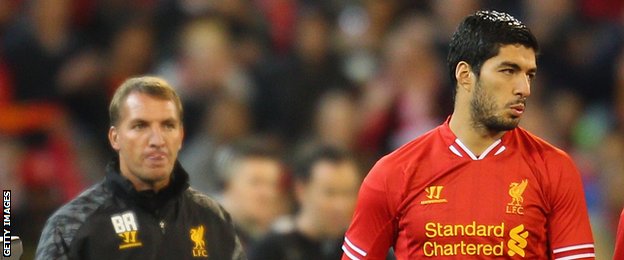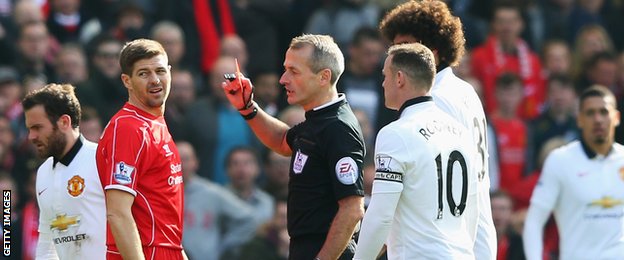Brendan Rodgers was sacked as Liverpool manager after travelling from the brink of history to Anfield oblivion in the space of 18 months.
On 27 April 2014, Rodgers was being carried along on a crest of euphoria that looked certain to make him the first Liverpool manager to win the title in 24 years.
A 2-0 loss to Chelsea, including the infamous slip from Steven Gerrard, started a chain of events that ended with his dismissal an hour after the 1-1 Merseyside derby draw with Everton at Goodison Park on Sunday.
So how did it go so wrong for a manager who seemed to have a glittering Anfield future in front of him?At the heart of Rodgers's demise at Liverpool was a failed, flawed recruitment policy that saw nearly £292m spent since the 42-year-old's arrival in the summer of 2012 - but most of the world-class talent he possessed walk out of the door.
And to add to the dysfunctional decline Rodgers presided over was Liverpool's infamous "transfer committee", the group that led the club's buying strategy and was responsible for far more failures than successes.
The committee consists (or we should now say consisted) of Rodgers, scouts Dave Fallows and Barry Hunter, the man in charge of analysis Michael Edwards, owners Fenway Sports Group's (FSG) Anfield representative Mike Gordon and chief executive Ian Ayre.
They sought value, often in young and unproven players who could be considered versatile - although in many cases jacks of all trades who were masters of none.
Twenty-three players were signed on permanent deals during Rodgers's reign. How many were unqualified successes?
Certainly Brazilian Philippe Coutinho at £8.5m from Inter Milan and Daniel Sturridge at £12m from Chelsea until he was struck down by a run of injuries that have wrecked his last 12 months.
After that you are struggling and some have been out-and-out flops, particularly the £20m spent on defender Dejan Lovren and the same sum spent on Lazar Markovic, who is out on loan at Fenerbahce after one unfulfilling season.
By targeting potential rather than the finished product, Liverpool have tried to navigate a route around a transfer system that can simply not be circumnavigated.
It also daubed a grey area on Liverpool's policy. Who was ultimately responsible? Rodgers said he had the final word but in many senses he was beholden to member of this committee whose track record suggests they were simply not up to the task of finding players for a club of Liverpool's ambition.
It certainly gives Rodgers a get-out when he can point, with justification, to the fact that Liverpool's struggles were not all down to him.
The other edge of this sword was that during this time of financial waste on an industrial scale, Liverpool saw the world-class Luis Suarez leave for Barcelona in a £75m deal, Raheem Sterling off to Manchester City for £49m and Gerrard quit Anfield to move to LA Galaxy. Transfer double jeopardy.
Did hope walk out of the door with Suarez?
When Liverpool received the cheque for Suarez after the Uruguayan shamed himself at the 2014 World Cup by biting Italy's Giorgio Chiellini, it presented an opportunity for Rodgers to fulfil a prophecy he made when Spurs sold Gareth Bale to Real Madrid for £85m a year earlier.
He said: "Look at Tottenham - when you spend over £100m you'd expect to be challenging for the league."
Rodgers did. And Liverpool didn't.
Sadly for Rodgers, when Suarez took his stardust out of Anfield it was followed by the cash from his departure - most of it squandered.
Liverpool targeted a player coming through the Nou Camp's revolving door, Alexis Sanchez as his replacement. He would have been a near-perfect replacement (if not quite as good) for Suarez but the lure of Arsenal in London proved too much.
This seemed to plunge Liverpool into transfer inertia. With no "Plan B" and only the somewhat off-the-wall £4m deal for Southampton's Rickie Lambert in the bag, they were left with three choices on transfer deadline day.
They could do nothing (which ultimately should have been the preferred option), sign Samuel Eto'o, whose legs could no longer stand the pace, or Mario Balotelli from AC Milan.
Rodgers had stated "categorically" that Balotelli would not be coming - so imagine the surprise and embarrassment when the Italian last resort arrived in a £16m deal with predictably abysmal results.
So not only was there no replacement that came anywhere close to giving Liverpool the flash of genius Suarez provided, the rest of the money was largely wasted on Lovren, Markovic, £12m defender Alberto Moreno, £25m Adam Lallana, as well as £10m on Emre Can, who may yet come good.
And not only did Liverpool lose a player who could grace any team in world football, they lost the money they raked in for him. This proved to be a toxic combination.
The road to decline
The beginning of the end for Rodgers started back on 22 March with the home defeat by Manchester United.
Liverpool went into the game on the back of a 13-game unbeaten run and back in top-four contention after Rodgers switched to a back-three system to cure a poor start to the season.
He was once again being feted as the coach of his generation, with tales of sitting up at 3am writing down his thoughts on a 3-4-3 formation that looked to have rejuvenated their campaign.
It all came crashing down that afternoon as United won 2-1 and captainGerrard lasted only 38 seconds after coming on as a half-time substitute for Lallana.
Rodgers never quite recovered.
It was followed by a heavy 4-1 beating against Arsenal on 4 April, then 15 days later the biggest setback of all, a pathetic, lame display in losing to Aston Villa in the FA Cup semi-final at Wembley.
The die was cast as Liverpool lost away to soon-to-be relegated Hull City, celebrated captain Gerrard's Anfield farewell with a comprehensive 3-1 defeat by Crystal Palace before the ultimate indignity of a 6-1 thrashing at Stoke City on the final day of the season, the first time the Reds had conceded half a dozen in the league for 52 years.
After another summer of spending, which included £29m Roberto Firmino from Hoffenheim and Christian Benteke at £32.5m from Villa, wins at Stoke and against Bournemouth rekindled mild optimism but a 3-0 home defeat by West Ham and a 3-1 loss at Manchester United probably sealed Rodgers's fate.
Like FSG's decision, the end was swift and decisive.
Rodgers at Liverpool: 1 June 2012 to 4 October 2015 | |||
|---|---|---|---|
Premier League
|
Cup competitions
|
Europe
| |
2012-13
|
7th
|
FA Cup (fourth round); League Cup (fourth round)
|
Europa League, round of 32
|
2013-14
|
2nd
|
FA Cup (fifth round); League Cup (third round)
|
Did not qualify
|
2014-15
|
6th
|
FA Cup (semi-finals); League Cup (semi-finals)
|
Champions League group stages, Europa League round of 32
|
2015-16
|
10th
|
League Cup(fourth round)
|
Europa League group stages
|
Liverpool owners' misplaced faith
FSG conducted a full review into Liverpool's last season, raking over the wreckage of a Champions League campaign that failed to crawl out of the group stage or make the top four.
Rodgers was hardly going in on a position of strength after that 6-1 loss at Stoke but knees do not jerk in Boston and the manager was given another crack, complete with the £49m raked in from Manchester City for Sterling and more besides.
It will be a source of regret to main man John W Henry and chairman Tom Werner that they have dispensed with the services of a man and manager they felt was the embodiment of their ethos - but they clearly feel he can no longer deliver what they demand.
The question is - do they now wish they had sacked him in the summer?
In defence of Rodgers
It does a grave disservice to Rodgers to paint his reign as a complete failure - this is a relatively young manager who has time to come again and make good on the potential he showed at Liverpool.
In 2013-14, in a blaze of attacking football and against all odds, Rodgers took Liverpool to the brink of the Premier League title. He was effectively a Gerrard slip away from writing his name into Anfield's rich history.
There has been some cheap rewriting of that season, claiming Rodgers rode to glory on the back of Suarez's brilliance.
This is a nonsensical argument akin to claiming Sir Alex Ferguson was only successful because of Eric Cantona.
Rodgers had a world-class player and devised a system that allowed him to flourish. He can hardly be criticised, or be expected to apologise, for that.
He always wanted to give Liverpool's fans the attacking, passing football they wanted. He fell short - but it was not for the want of trying.




No comments:
Post a Comment